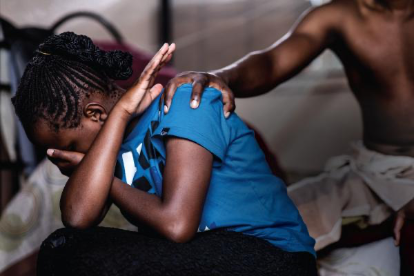A single mother of two Olaonipekun Adenike from Ogun State, has described her terrifying experience of traveling to Libya by car in quest of a better life, a journey that ended in near death, rape, and exploitation.
The 30-year-old woman, raised in Sagamu, Ogun State, said she came from a family where girls’ education was never a priority. “I’m from a family that doesn’t believe girls should have access to education, and from a community where they see travelling abroad as the biggest achievement,” she explained in an interview with PUNCH.
Her ordeal started when a close friend of her mother’s, whom she had known since childhood, reached out to her again on Facebook and offered assistance. “She said my mum had done a lot for her and this was her way of repaying her kindness — by taking me to Libya. She told me I’d only work for three months and then be free,” Adenike said.
Adenike viewed this as a lifeline as she desperately sought to continue her education at the National Open University in Abeokuta. However, the promise quickly unraveled.
She travelled from Sagamu to Lagos, then to Kano, before heading to the Niger Republic, where the real nightmare started. “We passed through many countries, spent three months in the desert with little food or water. Some people died. We even drank urine to survive,” she recalled.
But the most traumatic moment came at an unnamed border crossing. “It wasn’t our fellow travellers who raped us; it was the policemen at the border. They randomly picked women and raped us before allowing us to continue,” Adenike said, her voice heavy.
It was at that point that she realised the promises she had been given were all lies. “I never imagined I’d be raped just trying to get a better life.”
When she finally reached Libya, Adenike discovered she had been sold. “My mum’s friend said I spent too long on the road, so she sold me to a Ghanaian man. My name was changed to Ibrahim Aishat, I was given a Ghanaian passport, and told I’d work for one year and six months — not three months like they told me in Nigeria,” she said.
The Ghanaian man handed her over to an Arab who kept her as a maid for 18 months. “I couldn’t even buy clothes. It was my Arab boss who fed and clothed me. Meanwhile, the Ghanaians came every month to collect the money I owed.”
After finally organizing her travel documents with the assistance of a friend who called the embassy, Adenike’s nightmare got worse when she was arrested while en route to pick them up. “My mother sold her land to send money to the police, but they still returned me to prison,” she said. She spent a month there under terrible conditions.
A kind policeman eventually helped her escape, but only for her to be handed over to more traffickers. “They sold me to a brothel. I was stripped naked so men could see what they were paying for. It was hell,” she said.
She spent two weeks there, forced to sleep with men. “They dropped us at the brothel every morning. One day, I was dropped first at the house, so I climbed a fence and escaped.”
Adenike ran to the embassy, where she stayed for two weeks before being put on a government-chartered flight back to Nigeria. “We landed in Port Harcourt, were profiled in a warehouse, then Ogun State Government sent a bus to take some of us to a cultural centre in Abeokuta.”
Asked why so many Nigerians risk these journeys, Adenike said, “It’s poverty, lack of information, and being lied to. Many think they’re going to Europe, but end up stuck in Libya.”
Adenike and her two children, one born prior to her tragic journey and the other following her return, are back in Nigeria today. “Every Nigerian I met in Libya had one issue or another. You were either working for someone or in prison. There was barely anyone to help,” she added.



